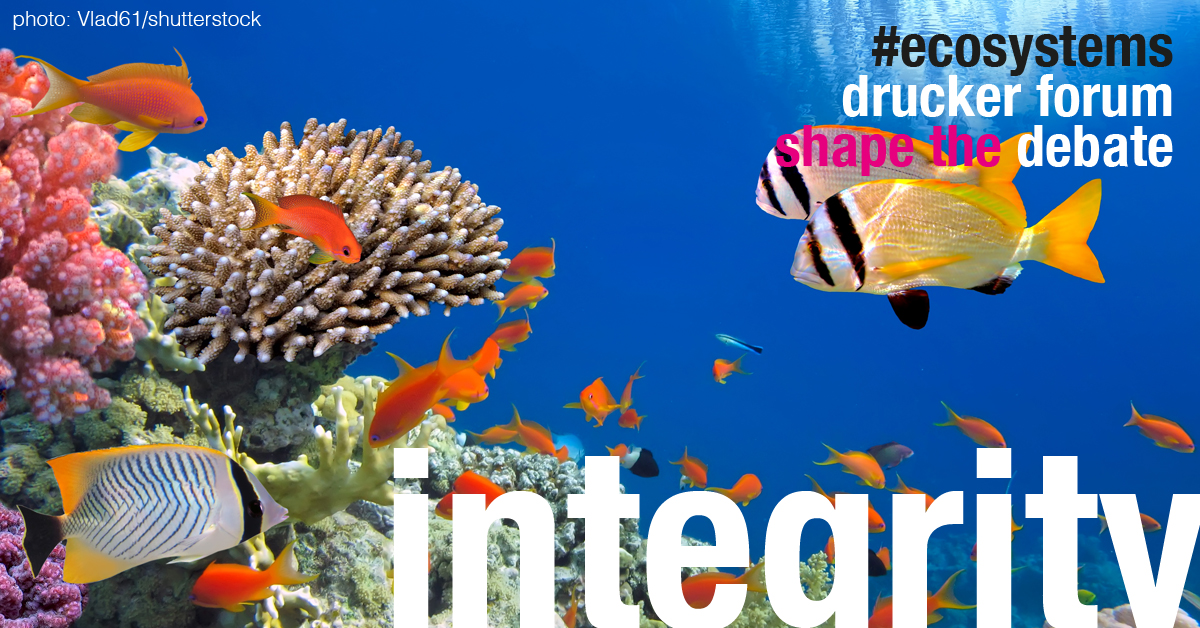
The 2019 Global Peter Drucker Forum will focus on a world of ecoystems, with their many complexities, opportunities, and unknowns. In a globally networked economy in which the boundaries between firms and even industries are blurring, how do companies build trust within their governing structures? Beyond contractual NDAs or other forms of legal agreement, what is the best way to ensure decision rights are clear at the intersections between firms and industries, especially when in some contexts ecosystem partners may also be competitors? How do you ensure integrity is the bedrock across the value chain of an ecosystem?
My 15-year longitudinal study revealed four factors that determine whether people will lie or withhold the truth within a business context. Two of these factors are directly relevant to the healthy design of ecosystems.
Drucker Forum 2019
Ensure roles and purpose are strategically clear. When the purpose of an ecosystem is unclear, or the roles of participant’s contributions are ill defined, you are three times more likely to have dishonesty among participants. The value to consumers as well as to participating members of the ecosystem must be clear and shared. Nokia’s painful example of Symbian’s failure offers a warning – when the value of partners isn’t considered or thoughtfully defined, they will become self-interested, and eventually defect. Finding the right combinations of industry leaders and those who can best complement them with shared products and services means narrowing choices and being clear on who contributes what and why. Apple and Google have mastered this by tightly controlling the numerous ecosystems in which they are central orchestrators. What makes ecosystem strategy complex is that it must have clear value for both the businesses participating as well as the consumers they serve together, ensuring that one doesn’t compromise the other. Once strategic clarity is diluted, ecosystem partners retreat to serving their own interests at the expense of the broader system.
Define governance with appropriate transparency. Ecosystem governance design is a nascent process. From loose, open systems to tightly controlled participation, and everything in between, the legal and contractual structures are not sufficient to build integrity into governance. Making sure decision rights provide levels of participation that keep participants satisfied with their respective degrees of control while still building levels of loyalty to the ecosystem can be tricky. If they have too little control, self-protection may motivate either leaving or guarding their contribution. Too much freedom and they may be ambivalent about staying. When governance is unclear, you are almost four times more likely to have dishonest behavior. Establishing decision rights across the ecosystem participants, rules of engagement, conflict resolution processes, and well defined behavioral rules of engagement helps ensure that those invited into the ecosystem know what’s expected, and what they can be held accountable for. Governance designs that manage partnerships with mutually defined standards not only raise the quality of the products and services being jointly created, but strengthen mutual commitment to those standards, raising the odds that participants act with integrity.
As digital technologies shape consumer behavior, and regulations increasingly blur lines between products and services, ecosystems are an inevitability of how our economy will function. Designing integrity into them from the start will ensure they remain vibrant sources of innovation and value.
About the author:
Ron Carucci is managing partner of Navalent, bestselling author of eight books, including the Amazon #1, Rising to Power; The Journey of Exceptional Executives. He is a popular contributor at Harvard Business Review and Forbes.
This article is one in the Drucker Forum “shape the debate” series relating to the 11th Global Peter Drucker Forum, under the theme “The Power of Ecosystems”, taking place on November 21-22, 2019 in Vienna, Austria #GPDF19 #ecosystems


The importance of knowing our “role and purpose” cannot be over-emphasied.
This clarity of function is necessary for maximum impact in any sphere of the ecosystem(in which an individual is placed).
I think progress can be hindered without clarity of duties or functions.
When such structure is put in place, then there will be slight chances of “self interest at the expense of others.”
These are very important issues around governance, Ron. Thank you for laying them out so clearly. I wonder if you have any more direction around good approaches to governance other than the principles outlined above. Perhaps you can point me to something you’ve published elsewhere. Thank you, Sandra.